Institutional Pathways to Equity : Addressing Inequality Traps
Inequalities and development:
dysfunctions, traps, and transitions by Anthony J.
Bebbington, Anis A. Dani, Arjan de Haan, and Michael Walton.
Asset inequality and agricultural growth: how are patterns
of asset inequality established and reproduced? By Rachel
Sabates. Beneath the categories: power relations and
inequalities in Uganda by Joy M. Moncrieffe. Inequalities
within India's poorest regions: why do the same


